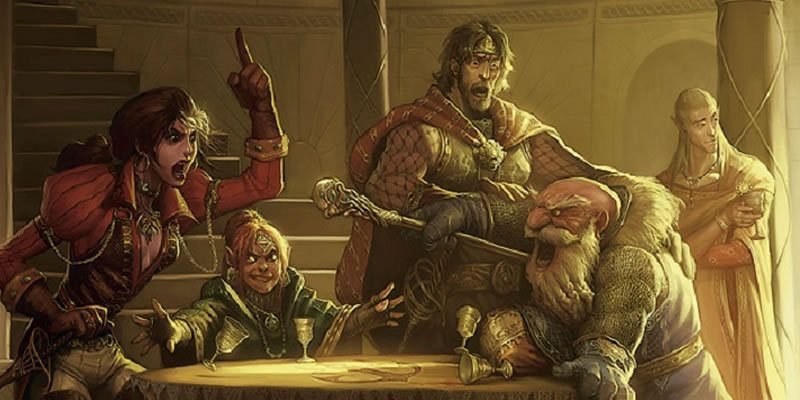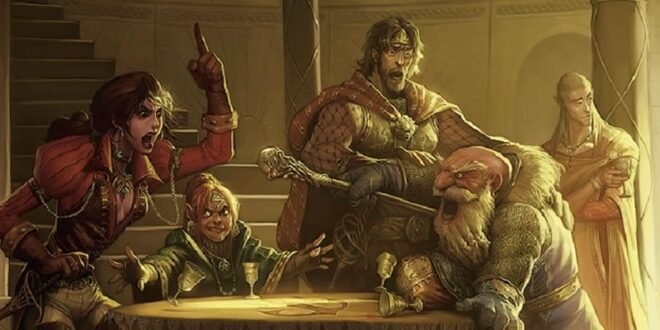A complaint I’ve seen is that you shouldn’t be able to persuade someone with “a single die roll”.
Of course not. Sometimes, yes, but that shouldn’t be the default. It really depends on how well the people involved see eye to eye.
Want an example? Go look up Disguised Toast on YouTube and see how he plays Among Us. That’s the Deception and Persuasion skills being used, and it’s a *process*.
How do you do this in D&D?
Well, simple. It’s multiple rolls. The character has a DC equal to the target’s Passive Insight (Insight + 10). They need to meet or surpass this a number of times.
How many?
Well, I’d say ‘up to the GM’, but we can do something a bit more crunchy as a *rule of thumb*.
Base #: Target’s Proficiency Rank
Modifier 1: Initial Stance
-2 if the target is allied
-1 if the target is friendly
+0 if the target is neutral
+1 if the target is unfriendly
+3 if the target is hostile
Modifier 2: The request is…
-2 very reasonable or helps the target significantly
-1 reasonable or along what the target would do
+0 somewhat reasonable or doesn’t hinder the target
+1 somewhat unreasonable or a minor inconvenience
+3 unreasonable or a significant inconvenience
+5 very unreasonable or very inconvenient
+7 goes against the target’s goals or is life-threatening
So, an enemy with a PR of +4 is being talked to by the PCs. This is ‘hostile’ (+3), and the PCs are trying to convince him to not do the Big Evil Plan. This would be very inconvenient – but they promise he won’t be killed and offer some ideas of a compromise (+5).
They need 12 successful rolls between them to wear him down. Keep track of each success until they get to 12. If they fail, their success count goes down by one. If it falls below 0, negotiations are over.
Pretty straightforward, I think? And the GM can easily give Advantage/Disadvantage or other modifiers based on what the players say / direction the conversation is going / the players hitting sore spots or picking things which resonate with the target.

Pick up the rest of this and more from the source:
all around the web
 DnD Replay DnD Resources and more
DnD Replay DnD Resources and more





I’m glad someone is trying to mix formal systems with informal ststems because all too often this game becomes a roll-playing game instead of a role-playing game. This sort of meeting in the middle helps the people who lack the skill to succeed by role alone and punishes those who don’t even try at all.
I like how this treats a social situation like combat.
Or, you know, roleplay the situation and gives bonuses / penalties to that one roll
Give me a str check but also pick up that 300 pound Boulder to succeed.
Just use a typical ‘extended task’ resolution mechanic. So set a DC set a ‘duration’ for each check. Then make a roll and record the effect number which is number more than the target number you rolled. So DC 15 you roll a 12 with +4 total 16 and that would be Effect Number 1 but of course you want to get a base score for hitting 15 so 16 gets you ‘2’.
The overall task has a total number you need to reach say 25 or whatever and you make check to keep on accruing effect numbers until you reach it. This was the system used in the FGU games, Traveller, etc etc
The limit on success them becomes time. If each persuade roll represents 15 minutes talking to the chieftain before the barbarian attack or 1 session in the 10 day court case then time and roleplay becomes the limiter.
Works really well.
persuasion is functionally PvE. think of it like climbing a cliff face, except for the social types
I just like that the go-to example for things they think should be impossible no matter what is always persuading a person to want to do something by talking to them
Very good
Well it really depends. Disguised toast very often is able to trick people without doing much because he has an understanding of how to make people trust him. That’s how high persuasion works
For normal things like asking for shopkeeper discounts, maybe it’s just a single roll. For high-stakes cases against a skilled negotiator, I require several checks with many circumstantial modifiers. A persuasion boss fight, if you will.
I would ask where would you think willpower could or should come into this?
I’d say it depends on what you’re trying to persuade someone to do. Is it very minor? No reason it can’t be a single die roll. Something major? Probably going to take longer work then that. I’ve had it happen both ways in my games.
The problem I have with the “Anti” Persuasion crowd is people are talked into All kinds of Crazy things, IRL.
Up to and Including killing themselves.
So, Yes, a Fantasy game (which is supposed to be Reality turned up to 11) Should have even Stranger things made possible.
Especially considering High Charisma is possible (the Highest Cha IRL would be to someone like Alexander the Great, and I don’t even see him having one greater than 20.)
And in games you can go up to 25 or (depending on the edition) even Higher
Fun subsystem, though I’d say its a little chunky due to it directly relating to an rp function, unless this is used specifically for bbegs or other direct antsgonist influences
I prefer to let the players actually /attempt/ their persuasion/Deception/etc alongside a couple dice rolls, it lets them get creative and think more in the bounds of their character. Whatever they think up may help or hinder their subsequent rolls, and i encourage them to get creative with ideas
Skill Challenge.
A D&D 4E subsystem, where you need to succeed X number of times before you roll 3 failed checks, with X denoting the difficulty of the challenge. Then it’s up to the DM to adjust the whole thing; perhaps bonus successes for particularly good roleplaying, or negating a failure, or what not.
I first played D&D in 1985. Between ’85 and ’95, I played over a dozen different systems, from AD&D to Werewolf. No internet. No cell phones. No youtube. Our table, our rules. When I came back to ttrpgs in 2020, one of the things that surprised me the most was how many options there were to play online! Amazing! I had no idea! The second thing that surprised me was how much people cared about how other people play! Who cares how anybody else plays? If it works for your table, that’s all that matters. Man, back in the 80s and 90s, we ignored or homebrewed SO many rules.
What you, as many often do, are confusing/conflating here is the contextual timing, in-game, of what many Persuasion checks, for instance, actually more often represents. It’s not that there should be multiple rolls but rather that many/most (not all, but the clear majority) of said rolls represent several minutes — and often an hour or more, in extended social situations — of RPing and mild blue-booking, with difficulties for “x” roll influenced by what was said/generally conveyed and the NPC’s starting point and predisposition. *THEN* the roll is made, with higher/lower DC and/or ADV/DISADV, as appropriate… not usually a combat-round-by-combat-round degree of rolls, so to speak. (This is similar to how many other tool/skill checks represent several minutes, hours or even days of “x” — working, investigating, researching, forging, etc — in similar ways.)
Only circumstantially should any type of multiple roll, graded-successes round-to-round/similar, occur as suggested in the OP. Otherwise, it’s the premise-error of perception relative to what, and how long, many Persuasion/Deception checks involve that is the issue here — not the actual rolling mechanic itself, which is fine as-is.
I think it’s easier to use the table from the DM screen.
From memory it’s something like.
Trivial 5
Very Easy 10
Easy 15
Moderate difficulty 20
Difficult 25
Very difficult 30
Almost impossible 35.
Lol you realise what you’ve done is just a variant of rules that already exist in the dungeon masters guide right?
You really need to think through simple scenarios when you put up a system like this. Start with that same person, but neutral and being persuaded of something reasonable to them. The persuader has +6 and the defender has a passive score of 10.
The persuader starts by immediately failing the whole thing 20% of the time by failing the first roll.
40% of the time he succeeds in 4 rolls.
20% of the time he’s rolling 5 or more times for an outcome with the same sort of split.
The system completely falls down for people who are less persuasive. For starters if you get to numbers that give a 50% success rate, you’ve a good chance of rolling for a long time without a result.
I think you’re much better laying out several specific objections the target has, and persuasion requires overcoming them all.
This is nice. Need to save this one
That sounds like more rule bloat than anything else.
You roll on how well the process went. Same as attacks – rolling one dice to attack does not mean I slice one time, but how well my series of attacks went. More attacks does not mean I managed to swing my sword 3 times as fast, just that I found more oportunities to hit during the exchange.
If you want lots of modifiers just play pathfinder!
I feel like Alfred said it best.
“Some men can’t be bought, bullied, reasoned, or negotiated with. Some men just wanna watch the world burn.”
Some DM’s aren’t there to have a discussion. They planned for a fight, and they aren’t particularly good at improvisational conversation. It may not be a wholly satisfying answer, but not every DM is gonna be great at everything.
So for every negotiation with an NPC we’re going to be rolling and tracking 40+ times? No thanks.
That’s a solid way to look at it, but I think my kinda vague rule of “the better you roleplay this interaction, the less you have to leave up to the dice” works pretty well. The idea is approximately: they roleplay the interaction, and the better/more enticing of an offer they make in the roleplay, the lower the DC gets, but they still have to roll to see how the final modifiers work out. If they nat 1, maybe they’ve accidentally broken some major rule of etiquette, and a nat 20 means that, for reasons heretofore unrevealed, something about their request deeply touches the npc, and they bump up a step in the “friendliness ranking”. It also has the side effect of encouraging my players to immerse themselves more in the situation, which is nice.
That could go on all night. What a waste of a session.
That seems overly complicated. I just adjust the persuasion /deception /intimidation DC based on what the player actually did or said. I think this should largely depend on wits and roleplaying.
Sod that, i dont want to spend all night watching dice being rolled.
Roleplay how you persuade him, then roll for success. Sure real life is more complicated, but this isnt a real life simulator, and I want to keep it fun for everyone at the table. Roleplay people!
I like it. But yes, should only be applied to really critical points of the game. Not to make it harder, but also to signal to the players, “OK, this interaction is clearly a big deal. If this goes south… might be fighting. Or, conversely, might be able to avoid a fight and get an even more interesting and satisfying reward.”
Or you can use a deception check vs wisdom followed by a persuasion check.
Use the first to establish difficulty
From a purely mechanical standpoint, this could be workable. I’d add that roleplaying, or at least the players expressing ideas that could sway the opposition if they’re not as “charismatic” IRL, could also either affect the DC or the number of successes required.
This is why other systems have more than one skill for things that’s all I’m saying.
12 Successful rolls?
Pass. Slows down the game WAAAAY too much.